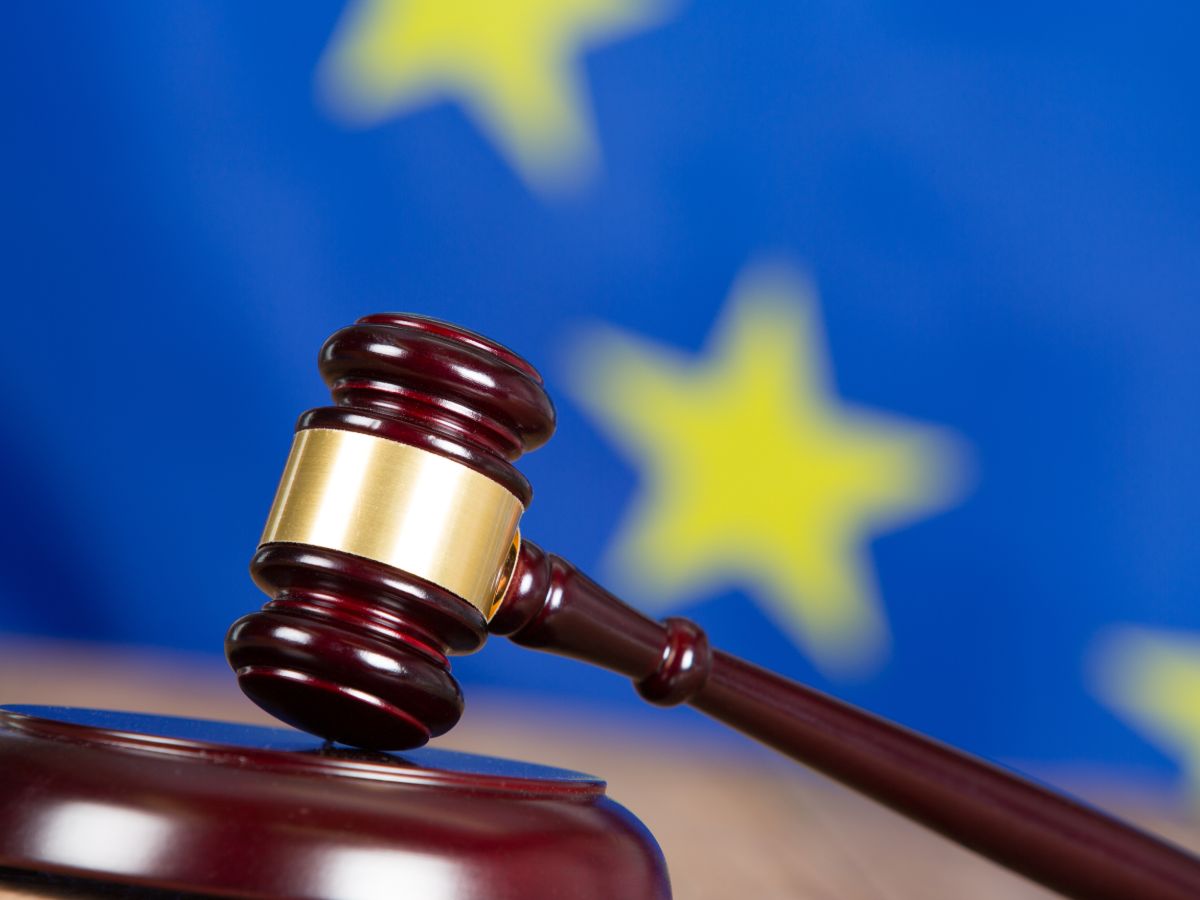
The proceedings and findings of the courts are referred to as “jurisprudence”, and the courts themselves are one of the three branches of government. In his famous 1784 book The Spirit of the Laws (“De l’esprit des lois”) Baron de Montesquieu stated that the freedom of citizens can be measured by the division of powers of its government, which is the only way to avoid abuse of power. The three traditional powers of the state, namely the legislature (legislative), administration (executive) and courts (judiciary) must each be independent in order to keep each other in check – “Le pouvoir le pouvoir arrête”, in Montesquieu’s words. This has not changed since his time. Perhaps today we recognize the importance not only of this “horizontal” separation of powers, but a “vertical” separation as well: the division of power between the national, regional local levels (→ Autonomies). Further, we recognize another political force on the horizontal plane, sometimes called the “fourth estate”: the power of the media (→ Media).
The judiciary’s role is to monitor the state administration and apply the law to individual cases. In the application of the law to actual situations – i.e. people’s concrete life circumstance – the jurisdiction is bound to the laws themselves. The so-called “third estate power” (judiciary) thus does not operate in a legal vacuum. In contrast to the executive and legislative, it is relatively removed from the political process of a society. The deciding judges are independent. They are not subject to orders, answerable only to their reputations for legal expertise. In addition, it is within the court’s jurisdiction to judge whether legislation is constitutional or contradictory to the constitution. When one regards the constitution fundamentally as a constraint of values to which society is obligated in abstraction, and simple laws as products of the political struggle to achieve majorities in Parliament, it is immediately clear why the judiciary is essential for the protection of minorities – be they ethnic minorities, language minorities, sexual minorities or others: It is the judiciary, which oversees that the majority-led democracy is not denying minorities their rights. This also applies to cases where societies use instruments of direct democracy such as referendums to deal with minority-related issues (→ Media, → Veil).
The European Court of Human Rights in Strasbourg (Council of Europe)

Photo: Adobe Stock/135pixels
At the European level, the Jurisprudence of the European Court of Human Rights in Strasbourg is particularly important to the development of minority rights. The Court in Strasbourg monitors the compliance of the Member States of the Council of Europe with the European Convention on Human Rights (ECHR, → Organisations). Cases involving the actions of states and falling within the scope of the ECHR can be brought before the Court at the point when domestic remedies have been exhausted. Although the ECHR contains no specific provisions for the protection of minorities, its human rights standards are a central concern in the court’s interpretation of issues pertaining to minorities.
As a full-time Court, the European Court of Human Rights has only existed since 1998. It has been called upon with increasing frequency ever since. Trials have lasted longer and longer, to the point that the Court has become the victim of its own success. On 18 September 2008, it announced its ten thousandth ruling. At the end of 2011 151,624 cases were pending before the Court. In the tradition of the Court, well over half of these cases were from four countries, namely Russia (40,225=26.6%), Turkey (15,940=10.5%), Italy (13,741=9.1%) and Romania (12,286=8.1%). Out of the 1157 judgments the Court delivered in 2011, the following five rights enshrined in the Convention were most frequently at stage: length of proceedings (341 judgments), right to liberty and security (261 judgments), right to a fair trial (211 judgments), right to an effective remedy (187 judgments) and inhuman or degrading treatment (183 judgments). Since the Court was founded, the applications have become more numerous from year to year. Whereas 8,400 applications were accepted by the Court in 1999, the figure rose to 64,500 in 2011. In addition to the 47 judges (18 of them women), some 270 attorneys are employed at the Tribunal, supported by another 370 employees. For all the Court’s activities in 2012, it has to operate on a meager budget of just € 67 million. The situation thus remains tense. The number of procedures is as high as ever. Against this background, the 2012 UK Chairmanship of the Council of Europe held a Ministerial Conference on the Future of the European Court of Human Rights in Brighton from 18 to 20 April 2012. The Conference adopted the Brighton Declaration, proposing a variety of reforms to the Court. Some of these proposals send ambivalent signals but at least the States commit to better implement in the future judgments of the Strasbourg Court. And in fact it is the underperformance of fundamental rights protection at the national level that generates the considerable pressure imposed on the European Court.
From the abstract and institutional to individual cases, in the following we shall take a short stroll through selected rulings of the European Court of Human Rights of particular relevance to the protection of minority rights.
Equality: What does it take to assure discrimination-free law?
In general, the discrimination ban in Article 14 of the European Convention on Human Rights (ECHR) is enforceable only together with other, specific ECHR-assured fundamental rights (→ Discrimination). It was unclear whether this prohibition of discrimination only prohibited treating like situations differently or whether it also banned the equal treatment of different situations. In its 2000 ruling on the case of Thlimmenos v. Greece, 34369/97, the Court stated that equal treatment of inequality constitutes discrimination. Specifically, a state imposing measures regarding objections to compulsory military service (in this case Greece), had discriminated on the basis of not taking the differing motivations in the objections into account. Mr. Thlimmenos, an avowed Jehovah’s Witness, was refused appointment as a certified accountant because of his criminal conviction for refusing compulsory military service on the basis of his religious and moral beliefs. The Court criticised Greece for being unfair in “failing to introduce appropriate exceptions to the rule barring persons convicted of a serious crime from the profession of chartered accountants”. A distinction has to be made between simple failure to fulfill a civic duty and the compulsion to violate one’s inner convictions. If all are sheared with the same comb, then the equality principle is violated (→ Formal Equality). In other words, egalitarianism sometimes leads to violation of equality!
The case of Nachova v. Bulgaria, 43577/98 and 43579/98, concerned the killing of two Roma by the military police. The two victims, who had absconded from military service, were denied prosecution and shot in broad daylight even though it was known that they were neither armed nor dangerous. Immediately after the shooting, the policeman yelled “Fucking Gypsies!” at witnessing bystanders. It is legally interesting that the Court, in its 2005 ruling, stated that the dubious actions of the authorities in handling this case constituted not only a case of the right to life being violated, but also that the authorities had failed to meet their obligation to take preventative measures against discrimination on the basis of ethnicity. They would have had to carefully investigate whether the shooting of Misters Angelov and Petkov (the two Roma victims) was not motivated by racism. The Court ruled the same in the 2007 case of Petropoulou-Tsakiris v. Greece (44803/04), which also involved Roma citizens: A pregnant woman had lost her child when kicked by a policeman. Here too, the Court reached the conclusion that the racial aspect of the case was not properly investigated. In the course of the trial, the Greek Deputy Police Chief had opined publicly that the Roma generally exaggerated complaints, and that this was part of a character assassination tactic that made it difficult for police to perform their work. Understandably, such details could give rise to doubt regarding the quality of criminal trials. The ban on different treatment applies well in the prosecution of crimes. Firstly, crimes that are racially motivated are not to be treated identically with those not committed with racist motives (→ Xenophobia). On the other hand, the authorities must do everything possible to find out the true motivations of the perpetrators, and not suppress facts in the trial that might indicate racial motivation.
That the discrimination prohibited by Article 14 of the Convention may also prohibit unequal treatment based on citizenship has also become evident in jurisprudence. Thus, in its 2009 ruling on the case of Andrejeva v. Latvia (55707/00), the Court held that it constituted a violation of the right to peaceful enjoyment of property (Article 1 of ECHR Protocol 1) in relation to Article 14 of the Convention, if a person residing in Latvia is denied pension rights solely because the person is not a Latvian citizen. Although Member States are entitled to a broad degree of interpretation of social freedom, unequal treatment of a person solely because of their nationality or citizenship cannot be justified.
The right to privacy as a protection for the lifestyle of the Roma?

Photo: pixabay/mohamed_hassan
Article 8 ECHR grants every individual the right to respect for his private and family life, home and his correspondence. In a number of cases, members of the Roma minority have sought protection for their “caravan culture” under this article. Indeed, the Court seems to recognize in principle that ECHR Article 8 protects the “way of life” of a minority. In any case, the Court ruled in 2001 that limitations on parking caravans can affect not only the inviolability of the home, but also limit the preservation of Roma identity and, in turn, their private and family life connected to their tradition (Chapman v. United Kingdom, 7238/95). Further, the ruling indicated an “emerging international consensus” among the Council of Europe nations recognising the obligation to protect the security, identity and lifestyle of minorities, “not only for the purpose of safeguarding the interests of the minorities themselves but to preserve a cultural diversity of value to the whole community”. At the same time, however, the Court in that case noted that this international consensus is not yet concrete enough to compel the individual states in one direction or another in any given situation.
The court also found a violation of the right to privacy in a 2009 ruling involving an accusation of sterilization without the patient’s consent. The eight plaintiffs were Slovakian Roma who gave birth by caesarean section in a public hospital and were rendered infertile after the surgery. Suspected to have been secretly sterilised on purpose, they demanded the medical records. They were refused, which the Court saw as a violation of ECHR Article 8 (K.H. v. Slovakia, 32881/04).
Freedom of religion: The state as a neutral broker between religious groups
Article 9 of the ECHR guarantees freedom of thought, conscience and, above all, religion. Everyone can thus avow his religion individually or together with others, publicly or privately. Particularly in this context, the question has been raised as to whether the state can enter into the aegis of the churches. The state must refrain from making certain restrictions, such as on the appointment of priests. On the other hand, it is quite possible – according to the Court – to limit the communication channels of certain faiths by, for instance, awarding radio licenses to some religious groups but not others. In the case of United Christian Broadcasting v. United Kingdom (44802/98) it was stressed that such restrictions can be considered particularly necessary in a democratic society if that society is characterized by religious diversity. For then – as the Court ruled in 2000 – it is the obligation of the state to seek a fair, balanced relationship between the religions. At the same time, it is not the state’s role to take sides in the event of conflict between religious (splinter-) groups. In connection with a dispute over the succession of the late Mufti of Rodopi in Greece, the Court stressed that the state is to restore harmony without trading pluralism for forced homogeneity (1997 ruling on the case of Serif v. Greece, 38178/9). To comply with this duty of neutrality under ECHR Article 9, mere tolerance by the State is not enough. The state must allow the establishment of institutions and recognize the various communities. This does not mean that any special recognition or funding must be provided for every specific group. A small, strict splitting of the Jewish community in France was not granted approval for its special means of butchering. In its related 2000 ruling, the Court found no violation of ECHR Article 9 in conjunction with ECHR Article 14, because it was possible for this group to obtain meat that satisfied their (strict) slaughter rules even without such self-government (case of Jewish Liturgical Association, Cha’are Shalom Ve Tsedek v. France, 27417/95).
Freedom of expression and of assembly: the demands of minorities are no danger to society
Article 11 ECHR grants freedom of assembly and of association. As is apparent from the decisions in the 1998 cases of Sidiropoulos and others v. Greece (26695/95), Stankov and the United Macedonian Organisation Ilinden v. Bulgaria (29221 and 29225/95), this freedom may not be denied with regard to specific political demands of the respective groups. As stated in the Sidiropoulos verdict, neither territorial integrity nor national security were put at risk, and organisations that call for the promotion of minority cultures were appropriate, as “the existence of minorities was a historical fact that a ‘democratic society” had to tolerate and even protect and support according to the principles of international law”. In connection to this ruling, the Court referred to the OSCE Charter of Paris and the Copenhagen Document (→ Organisations). In the Stankov case, the Court maintained that calling for secession did not automatically justify the prohibition of the group in question.
In the so-called “Kurdish cases”, the Court had to address the issue of terrorism in the minority context. In balancing between human rights and political order, the Court took into consideration the nature of a particular publication, its dissemination, and the threatened punishment. The Court identified a violation of Article 10 in eleven out of 13 cases (the judgments date from 2009). In the two cases in which no human rights violation was found, the Court identified an incitement of violence in the expressed opinions of each plaintiff, as they actively endangered specific individuals. Also in 2009, the Court ruled that an association cannot be dissolved solely because it refuses the national identity of the state. This case concerned an association in Macedonia that denied the identification of ethnic Macedonians as Bulgarians. (Association of Citizens Radko and Paunkovki v. The Former Yugoslav Republic of Macedonia, 74651/01).
Article 10 ECHR guarantees freedom of expression, which includes the freedom “to receive and impart information and ideas without interference by public authority and regardless of frontiers”. The Court stressed that not only majority- or system-friendly ideas are covered by freedom of expression, “but also those that offend, shock or disturb; such are the demands of pluralism, tolerance and broadmindedness without which there is no ‘democratic society’” (stated in the 199 ruling in the case of Arslan v. Turkey, 23462/94).
Right to Education: No right to mother tongue instruction, but protection against segregation

Photo: Unsplash/Susan Yin
On the subject of mother tongue instruction in school, the Court noted that Article 2 of the first Additional Protocol to the ECHR, which grants the right to education, does not include education in the mother tongue (→ Education). Although the state is obliged to respect the right of parents to ensure such education and teaching in conformity with their religious and philosophical convictions, the Court has stressed that this does not amount to the consideration of the parents’ linguistic preferences (see, for example, the 2000 ruling on the case of Skender v. The Former Yugoslav Republic of Macedonia, 62059/00). In the case of Cyprus, it was determined that the closure of an existing school offering may well constitute a violation of law (the 2001 ruling in case of Cyprus v. Turkey, 25781/94).
After initial hesitation, the Court also made it clear that a segregation-like concentration of Roma children in special schools would be an injury to the right to education in the context of Article 14 ECHR. The key ruling was issued by the Grand Chamber of the Court in 2007 on the case of D.H. v. Czech Republic (57325/00). The circumstances of the case involved eight special-education schools and 69 elementary schools in Ostrava in which the distribution of Roma and non-Roma children was striking. The chance of a Roma child being enrolled in a special-education school was 27 times higher than that of a non-Roma child. The Advisory Committee of the Framework Convention for the Protection of National Minorities noted in 2005 that an estimated 70 percent of Roma children in the Czech Republic are enrolled in special-education schools. The Court accepted that the data are not 100 percent reliable (→ Organisations). It emphasizes, however, that it is concerned about the general trend, and that governments are not able to present any facts that might invalidate this picture. When a plaintiff presents plausible evidence that indirect discrimination has taken place, it is up to the responding State to prove the contrary (this reversal of the burden of proof was established in the Nachova v. Bulgaria judgement). Accordingly, the Czech Republic was found to violate the ECHR.
The European Court of Justice in Luxembourg (European Union)
The Court of Justice of the European Union situated in Luxembourg (CJEU) is significantly different from the European Court of Human Rights in Strasbourg. It is not a court specialised in human rights, but one that monitors the entire breadth of EU law, and therefore deals with economic regulatory, institutional or other topical issues, such as agriculture and the environment. In fact, the number of judgments on human rights issues is traditionally very low. For instance, the Court referred to the Charter of Fundamental Rights only 66 times between early 2001 and late 2008. The fact that the Charter became legally binding with the treaty of Lisbon has changed the picture: increasingly the Court is making reference to human rights (→ Lisbon Treaty). In 2011, the number of decisions quoting the Charter rose by more than 50 percent compared with 2010, namely from 27 to 42. When addressing questions to the Court of Justice (so-called preliminary rulings), national courts have also increasingly referred to the Charter: in 2011, such references rose by 50 percent compared with 2010, from 18 to 27.
Apart from the degree of specialisation, the Courts also differ greatly in size. The CJEU itself is composed of 27 judges and eight advocates-general. In addition, there are 27 judges in the General Court as well as seven judges in the Civil Service Tribunal, which deals with official matters. Thus, the three EU judicial courts consist of 69 individuals, 16 of them women. Altogether, the CJEU employs about 2000 people, and its 2010 budget was € 341 million. At the end of 2011 there were 849 cases pending, and over the year 444 judgments were issued. Because of this, compared to the Strasbourg court, with its substantially less intense caseload, the CJEU can also handle its cases in a fairly short time frame – with an average length of about 16 months, its proceedings are relatively short.
The CJEU has developed a dense body of jurisprudence on Anti-Discrimination Law (→ Discrimination). But regarding the protection of minorities in the narrow sense, the Court has thus far hardly been called to comment. To date, only with regard to minority language use has a relationship between EU law and minority protection been recognized. In its 1989 ruling on the Groener case, the Court sent two messages. On the one hand it declared that policies for minority protection may well come within the scope of EU law, and thus sometimes be subject to certain EU legal limitations (→ Yin and Yang). On the other, it appears very flexible, finding in the case at hand that citizens of other EU states could bear the burden of a protection system. Specifically, the case was about Ms. Anita Groener, a Dutch citizen who wanted to teach art at a college in Dublin, but who was not accepted into its faculty because she lacked sufficient knowledge of Irish. She invoked EU law on the grounds that the obligation to be able to speak Irish excluded her from taking up the position she had applied for and thereby limited her right as a worker to freedom of movement: that is, the possibility to freely travel and find employment anywhere in the EU. The Court disagreed, finding Ireland’s requirement of language skills legitimate, although in the particular design course Ms. Groener would have had to teach, had she received the job, they were not even required since the course in question was to be conducted in English. The Court thus respected the Irish Government’s intention to preserve and promote the Irish language. The Court deemed it necessary to require skill in a language other than the language of instruction, stressing that teachers such as Ms. Groener not only play an essential role in teaching, but also through their participation in the day-to-day activity of the school as well as their privileged relationship with their students. Therefore, it is not unreasonable to require of those teachers a certain competency in its first official language. One view of this somewhat convoluted argument is that the Court was avoiding the touchy subject of the Irish language policy (→ Speaking of Languages). Nevertheless, the Court stated that States do not have unlimited discretion to use their respective protection systems if EU citizens are burdened by it. Literally, the CJEU said: “The EEC Treaty does not prohibit the adoption of a policy for the protection and promotion of a language of a Member State which is both the national language and the first official language. However, the implementation of such a policy must not encroach upon a fundamental freedom such as that of the free movement of workers. Therefore, the requirements deriving from measures intended to implement such a policy must not in any circumstances be disproportionate in relation to the aim pursued and the manner in which they are applied must not bring about discrimination against nationals of other Member States” (Case C-379/87).
In 1998 the Court issued another ruling in the area of minority language protection, but this time it was not about whether EU citizens might be affected by the burden of such a system (an extension of the linguistic duty), but whether the privileges of such systems have to be extended to EU citizens, simply because they happen to live in the same area as the minority to be protected (an extension of a linguistic right). The cases in question involved Mr. Bickel, an Austrian citizen who in 1994, as a truck driver passing through South Tyrol, was stopped in Kastelbell by a carabinieri patrol, and Mr. Franz, a German national, who visited Taufers in 1995 while on holiday in South Tyrol. (Case C-274/96). Both of these EU citizens faced criminal charges: Mr. Franz for possession of a prohibited knife that exceeded the legally allowed length, and Mr. Bickel for drunk driving. Both defendants were not strong in the Italian language, and demanded that they, like the residents of South Tyrol, were entitled to use German in their proceedings, even though they were not members of the minority for which this linguistic protection was actually conceived. The Court found in favour of the EU citizens in both cases. If only those based in South Tyrol could claim the privilege of bilingualism, this would exclude all German and Austrian nationals, even though they speak the same language as the South Tyrolean minority. So such an exclusive rule would result in protecting only German speakers from South Tyrol, who are predominantly Italian citizens. Such an indirect discrimination based on citizenship is not acceptable, especially when the extension of the right in question to other German speakers (from Germany or Austria) does not endanger the South Tyrolean minority. The “Bickel/Franz-effect” will therefore result in some of the advantages arising from a regional minority protection system being extended to all EU citizens who are in a similar position to the minority members. However, when it comes to the allocation of scarce resources such as jobs, social housing and the like, the extension of benefits would indeed endanger the protective system. It is therefore clear that in such constellations EU law will not work at all costs to promote expansion of such a system to all EU citizens who are in a comparable situation as those persons who belong to the protected minority.
Two take aways:
- Of the three branches of government, the judiciary is that which operates most independently of the respective political majorities, and is therefore of particular importance for the protection of persons belonging to minorities. At the European level in particular, there is the Court of Human Rights in Strasbourg, which contributes to the development of European standards in the area of minority protection, despite the fact that the European Convention on Human Rights (ECHR) contains no special rights for minorities. The European Court for Human Rights shows in various contexts to which degree special needs and problems of minorities have to be taken into account and hence provides guidelines for interpretation.
- The Court of Justice of the European situated in Luxembourg (CJEU) has rarely been faced with minority legal issues, only with a few cases regarding issues of minority language use. However, with the Treaty of Lisbon in force since end of 2009, case law at the Court of Justice is expected to be increasingly relevant for the protection of fundamental rights, including the rights of persons belonging to minorities.
